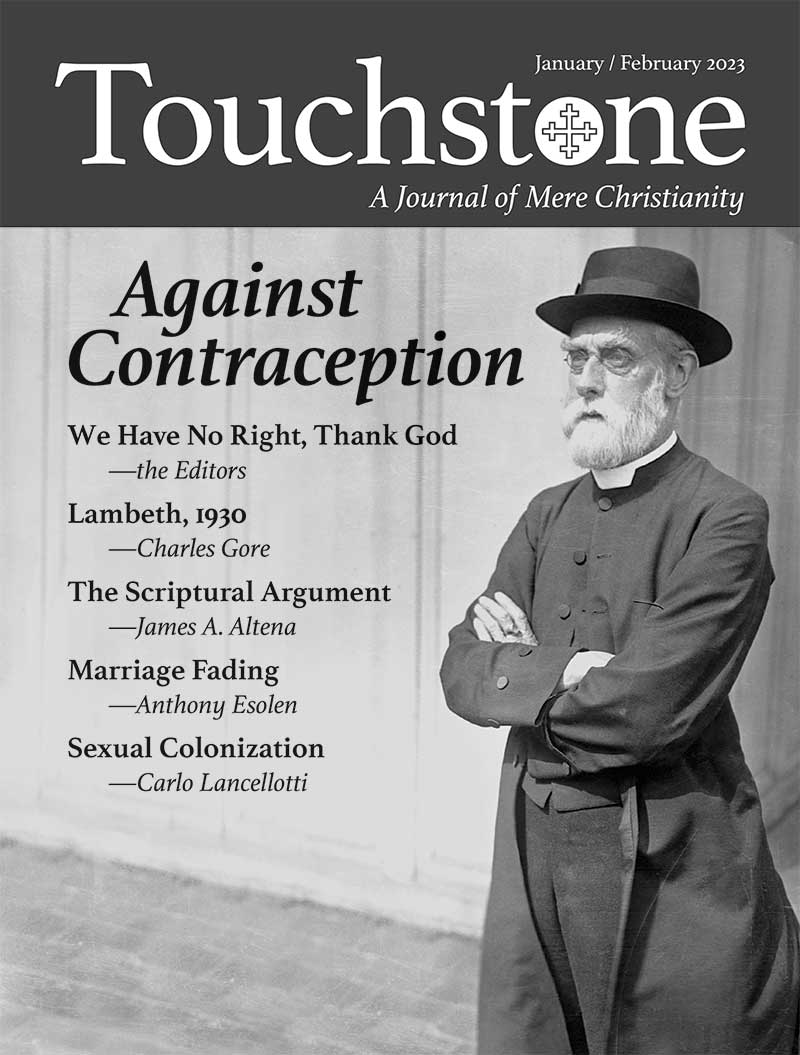Contraceptive Cons
A History of the Protestant Debate over Contraception
May Christians utilize intentional forms of contraception? On few other ethical issues do Protestants remain as strongly divided. This is due in good part to the fact that, apart from the episode of Onan (Gen. 38:1–11), the practice is not mentioned in Scripture. Consequently, arguments pro and con are made inferentially from more general biblical principles. Anti-contraceptionists point to the repeated biblical injunction to “be fruitful and multiply” as the essential principle governing marital coitus; pro-contraceptionists stress other aspects of the marital bond, gospel liberty, and prudential considerations of stewardship.
In virtually all of the various arguments, however, one central issue dominates: Is propagation, by divine ordination and design, the sole or principal and irreducible purpose of marital coitus? Or are other purposes of equal or even greater importance, not merely distinct from procreation but autonomous ends that may be pursued in their own right? As a convinced Protestant, I will argue here that the patterns of both scriptural and general revelation point to all intentional uses of contraception, whether mechanical or chemical, as fundamentally violating the principles governing the creation ordinance for propagation, and hence those governing the right uses of sexual relations within marriage.
Uniform Condemnation
Several different rationales have been presented over the centuries as the proper scriptural purposes of marriage. The fathers and medieval scholastics unanimously denounced contraception as a heinous sin and considered procreation within wedlock the only licit reason for coitus; Augustine further restricted relations to times of maximum fertility and considered taking pleasure in the act a venial sin.
The Protestant Reformers conceived the purposes of marriage more broadly. The liturgy for “The Solemnization of Matrimony” in the 1549 and subsequent editions of the Anglican Book of Common Prayer, which many other English-speaking churches adapted for their own use, identifies three “causes for which Matrimony was ordained”: “procreation of children,” “a remedy against sin, and to avoid fornication” (1 Cor. 7:2), and the “mutual society, help, and comfort” of man and wife (Gen. 2:18; Prov. 5:18–19; Eccl. 9:9). The 1646 Westminster Confession of Faith similarly identifies marriage as being ordained for “the mutual help of husband and wife,” legitimate procreation, and the “preventing of uncleanness.” The discussion of the Sixth Commandment (the Seventh for other Protestants, as in this essay) in the Lutheran Book of Concord also stresses procreation, stating that God instituted the estate of matrimony so that a man and woman might “live together, be fruitful, beget children, and nourish and train them to the honor of God.”
However, the Reformers also abominated contraception. Luther averred of Onan’s act of coitus interruptus that “we call it unchastity, yes a sodomitic sin,” while Calvin in his commentary on Genesis termed it murder and set the traditional Reformed standard:
The purposeful spilling of semen outside of intercourse between man and woman is a monstrous thing. Purposely withdrawing from coitus, so that the seed drops on the ground, is twice as horrific. For this is to extinguish the hope of the human family and to kill before he is born the hoped-for offspring. This wickedness is here condemned by the Spirit in the most severe manner possible. . . . When a woman in some way expels the seed out of the womb, using drugs, then this is rightly seen as an unforgivable crime; and Onan rightfully incurred upon himself the same kind of punishment. . . .
Numerous Lutheran, Reformed, Anglican, Methodist, Congregationalist, and Anabaptist theologians likewise denounced contraception—a short list of famous names from the sixteenth to eighteenth centuries includes (among many others) Henry Ainsworth, Abraham Calovius, Johann Gerhard, John Gill, Matthew Henry, Franciscus Junius, Wolfgang Musculus, David Pareus, Matthew Poole, André Rivet, Jeremy Taylor, James Ussher, and John Wesley. So too did the Synod of Dort, and the eleven Puritan divines headed by William Gouge who produced The Westminster Annotations and Commentary on the Whole Bible (John Ley being the commentator on the Pentateuch, including on the sin of Onan).
The Roman Catholic Church likewise maintained absolute opposition to contraception, though the landmark 1968 papal encyclical Humanae vitae broadly distinguishes two chief but conjoined aspects of marriage as procreative and unitive, with the latter being an expression of the former.
The Dam Ruptures
Only with the advent of post-Enlightenment liberal theology, which adopted secular racialist and eugenicist arguments against “race suicide,” did dissenting voices in the Church first emerge, shortly before 1900. As Allan C. Carlson has shown in his book Godly Seed: American Evangelicals Confront Birth Control, 1873–1973, this opposition arose primarily from the ranks of social gospel proponents, often in concert with advocates of women’s rights. But only with the 1930 Lambeth Conference statement by the bishops of the international Anglican communion did any major church body break ranks to allow for even limited resort to contraception by married couples.
Once that dam ruptured, though, many other denominations and ecumenical forums soon followed suit, stressing the need to counter a projected global population explosion. Especially notable were the 1959 World Council of Churches statement, “A Report on Responsible Parenthood and the Population Problem”; the 1961 National Council of Churches sequel, “Responsible Parenthood”; and a November 1968 statement by several leading Evangelical Protestant theologians published in Christianity Today as a riposte to Humanae vitae, “A Protestant Affirmation on the Control of Human Reproduction.”
Two factors in particular are striking about these documents and the apologetics for them. First, after asserting that Genesis 1:28 is to be understood as a blessing and not a command, they consistently speak of children not as being a blessing, but a burden and hindrance—a drain upon finite resources of materials, time, and energy; a diversion from the pursuit of other activities of greater importance; and even a complication interfering with marital closeness and sexual pleasure.
Second, they are all coupled to wide-ranging justifications for “therapeutic abortion” as morally justified not only for physical but also mental, emotional, and spiritual well-being. (The influential volume Birth Control and the Christian: A Protestant Symposium on the Control of Human Reproduction, edited by Walter O. Spitzer and Carlyle L. Saylor, which includes the entire 1968 Christianity Today pro-contraception symposium, devotes almost 200 pages to rationalizations for abortion.)
Today most Protestant churches, including conservative Presbyterian/Reformed, Lutheran, Methodist, Baptist, and Evangelical bodies, pronounce use of contraception by married couples to be a licit matter of private discernment. (The online post “Contraception” on Christian Biowiki provides a list of major Protestant denominations with official statements on the topic.) Pro-contraception theologians such as Bruce Waltke and Stanley Grenz respectively redefined the purposes of marital coitus to be procreation, unity, companionship, and pleasure (Prov. 5:18–19; 1 Cor. 7:5; Song of Songs) or procreation, covenant, and celebration of mutual submission. Both the changes in terms and shifts in their order are significant. Whereas the Book of Common Prayer makes procreation the chief purpose of matrimony and places mutual help last, the Westminster Confession of Faith and Book of Concord respectively follow Calvin and Luther in placing mutual help first.
Many pro-contraceptionists cite this shift to deny both the primacy and necessity of procreation to marital coitus, and replace remediation of sin with pleasure as its purpose. For example, Grenz claims that Jesus and Paul set church fellowship above marriage and family bonds, and that this “suggests that bearing and raising children is no longer the highest goal or outcome of marriage.” In Does the Bible Forbid Family Planning?, Reformed pastor Jeffrey J. Meyers asserts even more definitely that “there is nothing in the text of Genesis 1–3 to make us believe that Adam and Eve’s marriage had for its primary purpose procreation. . . . Procreation is not the primary feature of marriage. Neither is it an essential feature.” Indeed, he summarily dismisses any effort to identify the “essence of marriage” as “reductionistic” and slighting of its richness. Reformed pastor James B. Jordan adds (with original emphasis): “Sex feels good, and it is fine to have sex for fun. It is fine to have sex even if you are not intending to have children (provided you are married, of course).”
Arguments Against
The anti-contraceptionist argument from Scripture for procreation being the primary, though not sole, end of marital coitus is quite direct. The creation ordinance injunction to “be fruitful and multiply” occurs twelve times in Scripture in that or very similar wording (Gen. 1:22,28; 8:17; 9:1,7; 17:20; 28:3; 35:11; 48:4; Ex. 1:7; Lev. 26:9; Jer. 23:3), and another seven times in more varied forms (Gen. 17:6; 26:22; 41:52; 49:22; Ex. 1:12,20; Ps. 128:3). The consequent promise to Abraham that he will be the father of an innumerable people by conceiving Isaac through Sarah is reiterated and recalled eight times (Gen. 13:16; 15:5; 16:10; 17:1–8, 15–21; 22:16–18; 1 Chr. 27:23; Jer. 33:22). It is extended first to Isaac and Rebekah (Gen. 24:60; 26:3–5, 24), then to Jacob (Gen. 28:3–4, 10–15; 32:12; 35:11–12; 48:4) and his wives Leah and Rachel (Gen. 29:31—30:24; 35:16–20), and ultimately to Ruth (Ruth 4:11).
God promises the Hebrews in the wilderness that they will populate the land of Canaan (Ex. 23:30; 32:13; Lev. 26:3,9) and extends that pledge to the exiles returning from captivity in Babylon (Neh. 9:23). He makes more general promises of increase on multiple occasions (Deut. 1:10–11; 6:3; 7:12–14; 10:22; 26:5; 28:1–14 passim; 30:15–20; 2 Chr. 1:9; Job 5:25; 42:12–13; Prov. 17:6; Is. 27:6; Jer. 23:3; Ezek. 36:9–11; Hos. 1:10), along with threats of barrenness as a punishment for unfaithfulness (Deut. 4:26–27; 28:15–20, 62; Ps. 37:28,38; 109:10–13).
Fecundity is asserted to be a mark of divine favor (1 Chr. 25:5; 26:5; Ps. 127:3–5; Ps. 128), and a godly wife directs a household that includes children, who along with her husband “arise up, and call her blessed” (Prov. 31:10–31), while Paul finds soteriological significance in childbearing (1 Tim. 2:15). Relief from barrenness as a reproach is prominently highlighted in the OT account of Elkanah and Hannah (1 Sam. 1:1–2:10; 2:20–21) and its NT analogue of Zachariah and Elizabeth (Luke 1:5–25, 57–80). Finally, God has absolute sovereignty over occurrences of conception (Is. 66:9).
Arguments For
Pro-contraceptionist arguments first rely fundamentally on a negative inference from silence. What Scripture does not explicitly forbid is ipso facto permitted under the principle of gospel liberty; Scripture says nothing about contraception per se; therefore, its use is not prohibited, and anti-contraceptionists are guilty of legalism. Onan’s sin lay not in contraception, but in deceitfully violating the levirate marriage commandment (Deut. 25:5–10).
Second, they assert that Genesis 2:18 shows that the primary purpose of marriage is companionship and mutual aid, not procreation. “Be fruitful and multiply” is only a blessing, not a commandment; anti-contraceptionists commit a fallacy of division, misconstruing an injunction intended collectively for the human race as applying distributively to all its individual members.
Third, since naturally infertile marriages are nonetheless valid, procreation consequently cannot be either the primary or the ultimate purpose of marital coitus. Instead, “one flesh” union (Gen. 2:23–24; Matt. 19:5; Mark 10:7–9; Eph. 5:31) or pleasure is, and hence, intercourse may be pursued apart from procreation.
Fourth, the “dominion” injunction (Gen. 1:28) delegates to man liberty of discretion in how to fulfil the ordinance to populate the earth.
Fifth, assorted prudential considerations show why married couples may, sometimes even should, employ contraception in stewardship to limit family size. These include serious medical complications from pregnancy, poverty or inadequate financial resources (1 Tim. 5:8), personal stress, callings to other forms of gospel service, social pressures, concerns over overpopulation and its negative ecological impacts, and proleptic reduction of abortions and illegitimate births.
Finally, motives are stressed against methods as being fundamental for determining family size. This entire argument crucially maintains as its linchpin that marriage has multiple purposes beyond procreation, which are not only distinct but can licitly be treated and pursued separately and autonomously as ends in themselves.
Weaknesses of the Arguments For
Admittedly, patristic and medieval exegetes historically short-changed non-procreative aspects of marriage, and some modern anti-contraceptionists such as Charles Provan (The Bible and Birth Control), Mary Pride (The Way Home, ch. 5), and Bryan C. Hodge (The Christian Case Against Contraception) have been guilty of shrill polemics, factual carelessness, and theological eccentricities in their arguments. But pro-contraceptionists have the far greater liability of asserting without substantial evidence that procreation is not the chief and irreducible scriptural purpose of marriage. Instead, they cherry-pick a few isolated verses to assert their case inferentially, silently bypass or minimize with quick generalizations far more numerous and extensive passages of Scripture contrary to their position, and often employ a hermeneutic that uses one passage of Scripture to explain away another passage, rather than to buttress and amplify it.
The fundamental weakness of this strategy is plainly manifest here. First, no other purpose, including companionship, has anything near a comparable number of discrete supporting scriptural passages (the Song of Songs as a single unit is discussed below).
Second, while pro-contraceptionists are correct that the Hebrew imperative to “be fruitful and multiply” can function grammatically as an indicative (“you shall be fruitful and multiply”), it strains credulity to interpret all occurrences of this creation ordinance as being merely a promise of blessing and not a hortatory injunction. For example, given its immediate post-diluvian context, it is utterly implausible to argue that Genesis 9:1 is not a divine commission, but merely a benediction. It also makes no sense to interpret the injunction to propagate as being merely indicative, but the concomitant one to exercise dominion as imperative.
Third, this injunction is made not just to peoples collectively but also to specific individuals; in a post-Fall world, however, it assumes the form of a pursuit of faithful obedience that is not invariably fulfilled, and hence blame attaches not to accidental failure but to wilful disobedience.
Fourth, in Romans 1:16–32 Paul discusses those who “hold the truth in unrighteousness” regarding the “eternal power and Godhead,” who “became vain in their imaginations, and their foolish heart was darkened” and gave themselves over to idolatry and depravity (1:18–21). This corruption of truth is exemplified by homosexual perversion, in which they “change the natural use [of the body] into that which is against nature” and are “leaving the natural use of the woman” (1:26–27).
In other words, even the post-Fall, sin-corrupted mind and heart readily know, from the creational design of man and woman as members of one species with complementary procreative organs, the proper purpose, use, and manner of coition. These organs therefore cannot be merely for either intimacy or pleasure, since disordered sexual relations provide those just as readily. Procreative capacity is what distinguishes heterosexual intercourse from all innately sterile misuses of coition, whether in non-heterosexual intercourse, pedophilia, necrophilia, or masturbation. Hence, Paul says that a man becomes “one flesh” in fornication with a female harlot (1 Cor. 6:16), but nothing similar regarding sodomy. The secondary purpose of marital coitus, as a remedy for sin, provides the proper outlet for heterosexual passion (1 Cor. 7:8–9) that forfends its misuse through incest, adultery, and fornication, which respectively violate the Fifth, Seventh, and Eighth Commandments.
Fifth, Paul’s argument in Romans 1:16–32 leads to the most crucial point: while the purposes for which God ordained marriage are distinguishable, they are not, contrary to pro-contraceptionists, separable and at liberty for Christians to pursue selectively according to their own private, prudential judgments. Procreation and companionship are not severable in marital coitus. As even Bruce Waltke states in his contribution to the 1968 Christianity Today symposium, “Protestant theologians often justify birth control by separating these purposes of marriage from one another. But according to the Old Testament, the Creator instituted marriage to serve all these ends together.” Paul implicitly upholds that position, and one may not set the New Testament in theological contradiction to the Old.
Likewise, the Reformers’ uniform condemnation of contraception shows that, far from separating companionship from procreation in marriage and setting the former above the latter as wedlock’s primary purpose, they saw procreation as the intended highest expression of conjugal union. Dividing the purposes of marriage in order to practice deliberately sterile intercourse by contraception misconceives and abuses coition’s proper purposes.
The contrary assertion that anti-contraceptionists commit a fallacy of division with regard to procreation as a creation ordinance is unsound for three reasons. First, anti-contraceptionists recognize that, in a fallen world, God’s intended ends for the original creation design are not invariantly realized by his decretal will; but man is morally bound not to attempt to contravene that design, in obedience to God’s sovereignty.
Second, marriage as a remedy for sin and to avoid fornication is God’s gift to those not called to celibate continence; both estates of life are equally honorable.
Third, since anti-contraceptionists hold only that each act of coition must be open to the possibility of procreation without deliberate impediment, and not that procreation must result from each act, it is the pro-contraceptionists who commit a scope fallacy here.
The substitution by pro-contraceptionists of pleasure (physical or psychological) as a primary purpose of marital coition likewise is exegetically untenable. The Apostle Paul in 1 Corinthians 7:5 pointedly refers to marital relations in terms of mutual obligation instead. And while the Song of Songs celebrates marital love with praise of physical beauty, it nowhere suggests that coital pleasure may be enjoyed apart from procreative intent. Indeed, the entire context implies exactly the opposite. The text is saturated with imagery of natural plenitude—flocks of sheep and companies of horses (1:7–9; 4:1–2; 6:6); budding flora in spring, trees bearing fruit, and mandrakes for fertility (2:3, 11–13; 6:11; 7:7–9, 12–13; 8:5, 11–12), and abundance of ointments, spices, honey, wine, and milk (1:3, 12–14; 4:6, 10–14; 5:1, 12–13; 6:2; 8:14)—that point back to Genesis 1:22 and through that to Genesis 1:28.
Even if all this is taken as a promise of blessing and not a command, the aspects of unity and pleasure in marital coition are not severed from procreation; rather, both erotic pleasure and the emotional and spiritual intimacy of love are grounded upon and united in procreative fecundity and fruit. Likewise, in Genesis 18:11–15, Sarah’s “Shall I have pleasure?” is explicitly equated by God with “Shall I of a surety bear a child?” and not with the sensual pleasure of coitus; hence the consequent “duty of marriage” in Exodus 21:10 and Proverbs 5:19. To consider pleasure a self-sufficient purpose of marital coitus misconstrues a facilitating means for an autonomous end.
Meant to Grow
The Scriptural emphasis upon procreation as the irreducible proper end of marital relations is also a significant implication of Paul’s discourse in Ephesians 5:22–33 on marriage as signifying and embodying the mystery of the union of Christ to his Church. The Church is not created and sustained by God to remain static in its membership, by mere adherence of its existing members to orthodox doctrine, as indispensable as that is; on the contrary, its chartering commission and raison d’etre is to grow by evangelization (Matt. 28:19). It is a well-established theological principle that, when human society is rightly ordered under God, the family is both the church and the state in miniature, and conversely the church and state are the family writ large.
Now, suppose a denomination, or even an individual congregation, were to state, “Evangelism is not essential to the life of the church, but only one purpose for its existence among many. Furthermore, it is a purpose independent of and subordinate to the primary ones of worship and fellowship by our existing members. Consequently, having prudentially assessed our energies and resources with an eye to their stewardship, we have determined that we should forego evangelization and church growth in order to focus instead upon conserving and strengthening our current membership, and to devote ourselves to other forms of community outreach and service. To act otherwise, and presume that God will provide what is needful and bless the endeavor, would be irresponsible and a sin of presumption.” An orthodox, faithful Christian would immediately recognize this as a clear sign of a church that has become heretical or even apostate. (Indeed, some theologically revisionist modern churches have explicitly renounced evangelization as allegedly being cultural imperialism.)
And yet, when exactly the same rationale is applied to the family, calls to be open to God’s clear, chief purpose for the marital act, and to trust in his subsequent provision for the results, are rejected with assertions that he has entirely relinquished this matter to man’s dominion and will. Love and its fruits are viewed and treated as finite allotments to be rationed in a calculated fashion—as if God had said to Abraham, “I will multiply thee and thy seed, but not exceedingly, for all may leave off from bearing as they think best”—rather than as unbounded gifts given unreservedly according to the infinitude of God’s being as agape love (1 John 4:7–8).
Violations of the Ten Commandments
The family/church/state analogue also points to how use of contraception violates the OT Commandments. Another standard principle of biblical exegesis and moral theology holds that the particular sins specified by the Ten Commandments are also categorical heads that synecdochally stand for all related types of sins. Thus, the Fifth Commandment (“Honor thy father and mother”) also encompasses the obedience due to all duly constituted authorities, such as rulers, magistrates, military officers, employers, and teachers; and the Sixth Commandment (“Thou shalt do no murder”) also forbids felonious assault, libel, slander, gossip, and similar actions that injure others in either body or soul.
A synecdochal reflection upon the Commandments makes comprehensible the seemingly extreme assertion of Calvin and allied older theologians that the practice of contraception is a species of murder. Few would now defend the proposition that a merely hypothetical being can properly be said to be an actual object of murder. But since procreation is by divine intention and design the fundamental and irreducible purpose of marital coition, such a reflection shows that the use of contraception in fact violates several of the Commandments:
• the Fifth, in dishonoring the parents who brought one forth by marital procreation, by deliberately impeding further perpetuation of their lineage;
• the Sixth, by wilfully frustrating the generation of new life and thus disobeying the creation ordinance to be fruitful and multiply;
• the Eighth (“Thou shalt not steal”), firstly in depriving God, the family, and the church of their full and proper due, and secondly in misappropriating the marital act for selfish pleasure apart from its true purpose and attendant obligations;
• and the Ninth (“Thou shalt not bear false witness against thy neighbor”), in presenting a false public testimony of the proper nature of marriage.
• Finally, as with all sin, it violates the First Commandment by idolizing one’s own person, desires, and will in place of God.
Disposing of Red Herrings
Some red herring arguments by pro-contraceptionists require brief disposition. First, anti-contraceptionists do not object to pleasure in marital intimacy; they consider it a secondary, concomitant feature that enhances the primary purpose of procreation.
Second, except for a few extremists (Augustine’s idiosyncratic views were not adopted by the Church), they do not hold either that the woman was created primarily for procreation, or that married couples must strive to have as many children as possible, or that only acts of marital intimacy that maximize chances for conception are moral. They simply hold that all such acts should be fully open within naturally occurring circumstances to the possibility of conception without seeking to contravene God’s creational design.
Third, there is a fundamental moral difference between unplanned and accidental natural infertility—which, as the examples of Sarah, Hannah, and Elizabeth show, is not absolute—and deliberately pursued and created artificial sterility. Hence, post-menopausal coition is licit, since female infertility is an unchosen accompaniment of age and conception may still result; such a union (unlike one of two men or two women) therefore is still ordered toward procreation in principle. By contrast, both contraception and intentional self-sterilization by vasectomy or tubal ligation are sinful because they wilfully interfere with the divinely created purpose for coitus. Of course, medical procedures to treat grave illnesses that produce sterility as an unintended and undesired collateral consequence, such as a hysterectomy for uterine cancer, are morally licit per the long-established ethical “doctrine of double effect.”
Finally, opponents of contraception do not fallaciously suppose either that human actions to influence the outcomes of events violate divine causal sovereignty and are forbidden, or that transgression of God’s will negates or circumscribes such sovereignty per se. Rather, they hold that where God’s purposes can readily be known either from special or general revelation—and the primary purpose of coitus as procreative is known from both—man is absolutely obligated to conform his conduct to that purpose. (Astonishingly, some apologists for contraception have defended its usage on the grounds that “if God truly wants a baby to be conceived, he will ensure that it happens anyway”—as if Paul had said, “Let us do evil, for good still will come if God so desires.”)
This likewise explains the condemnation of Onan. Modern pro-contraceptionists argue that Onan’s sin was actually fraudulent violation and disobedience of the levirate marriage command, not contraceptive practice. But while Genesis 38:9 does encompass these dimensions, it is remarkable that no patristic, medieval, or Reformation exegete ever presented any such argument. Instead, they repeatedly and specifically condemned Onan for spilling his seed per se, as being an act of sodomy and/or proleptic murder, with the violation of the levirate ordinance being merely a specific occasion for that even greater sin. Hence God slew Onan, whereas the normal punishment for failing to perform the levirate duty was merely public disgrace (Deut. 25:5–11).
Pro-contraceptionists are thus in the position of arguing, from an idiosyncratic combination of sola Scriptura and semper reformanda, that the Church fundamentally misunderstood the import of Scripture on a major issue for 1,900 years, and must now be corrected by an allegedly better informed and more enlightened modern exegesis—one that, as noted, draws heavily upon discredited or much-disputed non-scriptural secular premises. For example, in “The Bible and Family Planning,” Reformed pastor James B. Jordan makes the astonishing, sweeping assertion that “the tradition of the Christian Church, East and West, Protestant and Catholic, is very unreliable in the areas of food, music, and sex.”
But application of this exegetical stance has no inherent limit; and indeed, it quickly migrated from legitimation of contraception to justification of homosexuality, on the grounds that OT injunctions against sodomy were misunderstood cultic prohibitions, and that biblical authors did not have a modern, scientifically informed understanding of human sexuality. To reject the collective wisdom and united witness of the historic Church throughout the ages is simply to reject both 2 Thessalonians 2:15 and 1 Corinthians 11:2, cut off one’s exegetical legs at the knees, and embrace with typical modernist hubris the fallacy that C. S. Lewis rightly termed “chronological snobbery.” The demand for an explicit biblical prohibition of contraception that ignores the entire scriptural logic of marriage and procreation and the evidence of general revelation—a logic that also obviates, for example, opposition to pedophilia between adult men and pre-adolescent girls—is the true legalism.
Natural Family Planning
Contrary to pro-contraceptionist polemics, the proper use of “natural family planning” (NFP) to space births of children is fully consistent with an anti-contraceptive stance. Employment of science and technology as human arts is licit so long as those either foster, or else do not contravene, natural capacities according to God’s creational design, or otherwise seek some sinful end. Hence, vaccines and prosthetics are moral, because they further life and health; so, too, is travel by aircraft, since that enhances man’s innate capacity for locomotion.
Sperm and ova are divinely designed to unite in procreation; while not every act of intercourse results in such a union due to accidental conditions, that natural function must not be intentionally contravened, as contraception seeks to do. While the creation ordinance to “be fruitful and multiply” does not mandate having any particular number of progeny, it does require that the fundamental intention of coition not be deliberately impaired. Arguments for the exercise of dominion and stewardship over natural capacities and resources, or various prudential considerations, cannot be invoked to justify the pursuit of ends directly contrary to the design and purpose of a creation ordinance. Gospel liberty is freedom from sin for service to God, not a license to pursue comfort and convenience.
Nor is the term “natural” unduly vague, as some opponents charge; rather, as the OT prohibition against intercourse during a woman’s menstrual cycle shows, it requires restraint of the fleshly desire for coital pleasure by limiting its exercise in accordance with the divinely designed and well-known cycle of monthly fertility. As for motives vs. means, in accord with 1 Corinthians 7:5, practice of NFP is to be undertaken with prayer, as a form of fasting and disciplining of fleshly appetites in self-denial to serve God; wilful use of it to avoid procreation altogether is of course sinful. By contrast, the use of contraception in pursuing sexual pleasure with procreative sterility is an attempt to have one’s cake and eat it too: it effectively provides a cover for lust under the hallowed veil of the marital bond.
Why the Rejection?
A crucial question remains: Why did so many Protestants succumb to rejecting their own theological heritage and so embrace the use of contraception? Obviously, part of the answer lies in the powerful pull that the disordered sexual urge exerts in the nature of fallen man, that impels him to find license and justification for sin. Coupled to this is the first sin of man, the desire to convert dominion over aspects of the creation to autonomy from submission to its more comprehensive principles of order.
To this can be added surrender to worldly blandishments and pressures, as a profoundly misconceived attempt to disown prior sins. Faced with secular accusations of prudery, Puritanism, and hypocrisy in matters of sexual morality, and confronted with real but too often ignored or downplayed sins of suppression, exploitation, and abuse of women by husbands and employers, too many Christians have responded by attempting to appease the world in discarding the traditional understanding of the marital bond as fundamentally procreative. A marriage license thereby has ceased to be a public sign of a couple’s submission to divinely ordained order and purposes, and has been converted instead to being merely society’s legal permit for pursuit of private physical and emotional gratification. God is then treated as having largely abdicated his sovereignty over the use of the marital act to the married couple.
Not surprisingly, given such a mentality, liberal Protestants have gone further and discarded even the residual restriction that sexual congress occur only within marriage between one man and one woman. And yet, many conservative Protestants who regard such liberalizing trends with dismay and even outrage resolutely avert their gaze from the root cause—the abandonment of the true scriptural purpose of marital coition as irreducibly procreative for the adoption of a worldly, hedonistic calculus.
Yet another factor is a profoundly flawed biblicism that (ironically, contrary to Acts 14:15–17 and Rom. 1:18–21 and 2:13–16) selectively rejects theological reasoning from the natural order and ostensibly demands reliance upon positive warrants of special revelation alone. Finally—as Allan Carlson has documented in analyzing the artful propaganda efforts of Margaret Sanger—Protestants also have acted shamefully here out of blind, reflexive anti-Catholic animus.
Metanoia Required
The bitter fruit of this embrace can no longer be denied or avoided. Fifty years ago, to their immense regret, many otherwise biblically devoted Protestants tragically granted their imprimatur to abortion by following the same pathway of erroneous ratiocination—they first subscribed to a negative theological premise, based upon an argument from scriptural silence and an appeal to gospel liberty, and then coupled that to an emphasis on multiple purposes for adult vocations (e.g., parenthood vs. professional careers) and addressing of worldly concerns—only to repent upon further reflection.
The issue of contraception now requires a like act of metanoia by them as well. The counsel of those who argue that, at least for tactical reasons, the issues of abortion and contraception should not be coupled, is misconceived, for the simple reason that the two have always been joined together at the root from the very beginning. We cannot pretend to evangelize and convert the world if we are not fully and unreservedly willing first to be converted ourselves. We ignore the warning of 1 Peter 4:17 to our own dire peril: “For the time is come that judgment must begin at the house of God: and if it first begin with us, what shall the end be of them that obey not the gospel of God?”
James A. Altena is the associate editor of Fanfare magazine, a comprehensive bimonthly periodical for reviews of classical music recordings. He is a member of All Saints Episcopal Church in Wynnewood, Pennsylvania, and is pursuing a Ph.D. in church history at Westminster Theological Seminary in Glenside, Pennsylvania.
subscription options
Order
Print/Online Subscription

Get six issues (one year) of Touchstone PLUS full online access including pdf downloads for only $39.95. That's only $3.34 per month!
Order
Online Only
Subscription

Get a one-year full-access subscription to the Touchstone online archives for only $19.95. That's only $1.66 per month!
bulk subscriptions
Order Touchstone subscriptions in bulk and save $10 per sub! Each subscription includes 6 issues of Touchstone plus full online access to touchstonemag.com—including archives, videos, and pdf downloads of recent issues for only $29.95 each! Great for churches or study groups.
Transactions will be processed on a secure server.
more on family from the online archives
more from the online archives
calling all readers
Please Donate
"There are magazines worth reading but few worth saving . . . Touchstone is just such a magazine."
—Alice von Hildebrand
"Here we do not concede one square millimeter of territory to falsehood, folly, contemporary sentimentality, or fashion. We speak the truth, and let God be our judge. . . . Touchstone is the one committedly Christian conservative journal."
—Anthony Esolen, Touchstone senior editor













